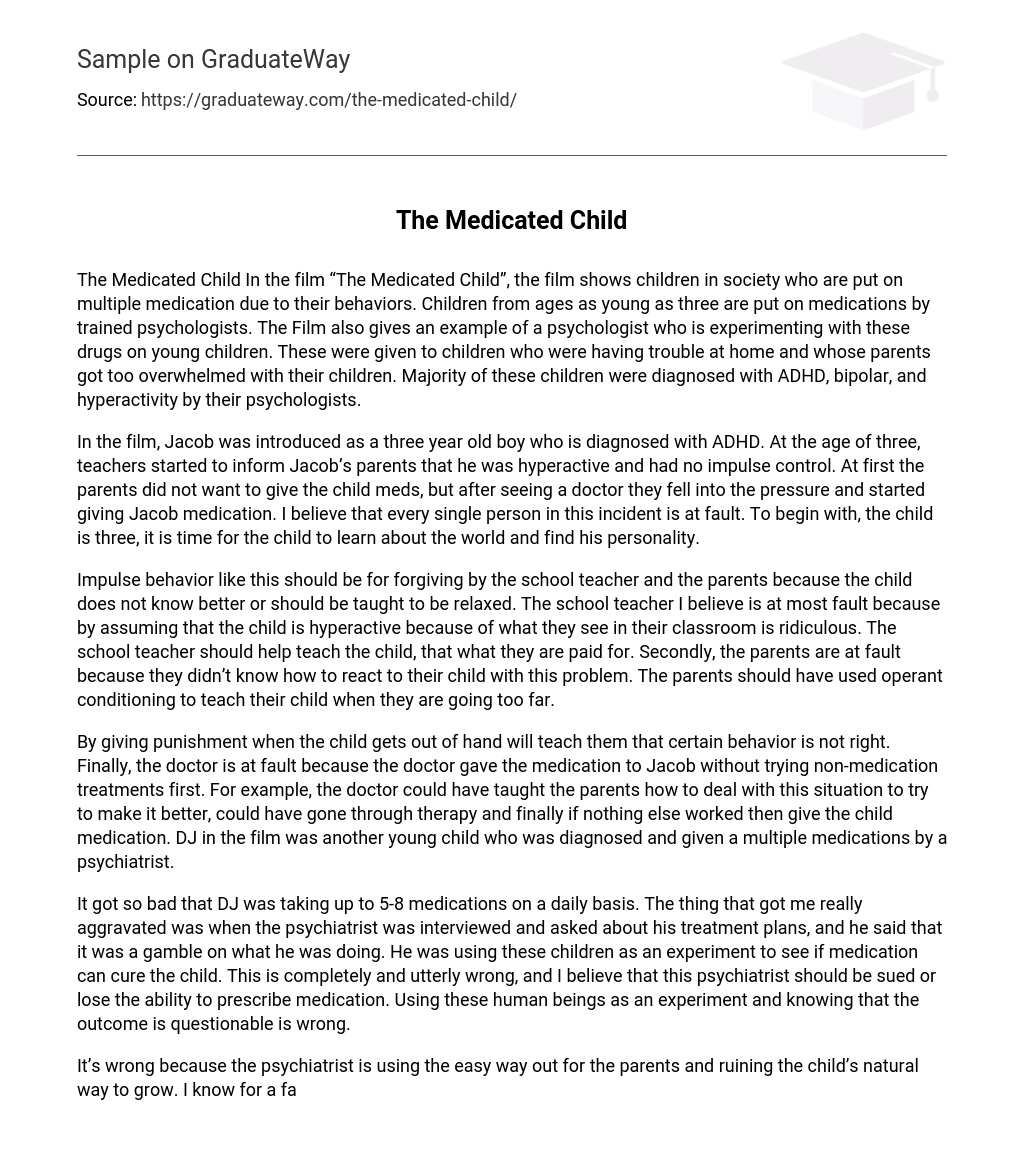“The Medicated Child” is a documentary film that delves into the societal practice of prescribing multiple medications to children. The film showcases psychologists giving drugs to even three-year-old children, as well as experiments conducted by a psychologist using these medications on young kids. Typically, these drugs are administered to children facing challenges at home, prompting their overwhelmed parents to seek professional assistance. Often, psychologists diagnose these children with conditions like ADHD, bipolar disorder, and hyperactivity.
Jacob, the film’s protagonist, is a three-year-old boy with ADHD. His teachers observed his early hyperactivity and impulse control challenges. Although hesitant at first, Jacob’s parents yielded to societal pressure and began medicating him. In my view, all parties bear responsibility for this scenario. At such a tender age, it is crucial to allow Jacob the chance to explore and nurture his unique personality.
Both the school teacher and parents should demonstrate understanding and forgiveness towards impulsive behavior in children, as they may be unaware or in need of guidance on how to calm down. The teacher has a significant responsibility and should not assume a child’s hyperactivity based solely on classroom observations. Their main focus should be on teaching the child. Additionally, the parents are also responsible for not knowing how to manage their child’s behavior. They could have used operant conditioning techniques to establish limits for their child’s actions.
The act of punishing a child when they misbehave serves as a way to educate them about appropriate behavior. Ultimately, it was the doctor’s responsibility for providing Jacob with medication without attempting non-medication treatments first. The doctor could have trained the parents on how to handle the situation and explore therapy options before resorting to medication. In the film, DJ, another young child, received a diagnosis and multiple medications from a psychiatrist.
It reached a point where DJ was regularly consuming 5-8 medications per day. What greatly frustrated me was when the psychiatrist was questioned in an interview about his treatment strategies. He admitted that he was taking a chance with his methods, using these children as subjects to test if medication could provide a cure. This is outright unacceptable, and I firmly believe that this psychiatrist should be held accountable through legal action or having their prescribing privileges revoked. Conducting experiments on these individuals, with knowledge that the outcome is uncertain, is morally wrong.
According to my perspective, the psychiatrist is taking the convenient route for the parents, potentially hindering the natural development of the child. If the doctor’s own child were in this situation, I am certain that he would reject these medications without hesitation. Instead, he would seek the absolute right course of treatment to heal his child, not merely experiment. What troubles me is that individuals seek this psychiatrist for guidance, reassurance, and assistance. They trust that the psychiatrist is wholeheartedly trying every possible means to cure their child; this is ultimately why they turn to them. Unintentionally prescribing these medications should be considered a criminal act.
According to Papalia (pg. g-2), discipline involves shaping children’s character, teaching self-control, and promoting acceptable behavior.
In the movie, the parents lacked effective disciplinary methods for their children. There was a clear absence of consequences for their actions and no use of physical discipline like spanking. Moreover, it seemed that the children were unaware that their behavior was inappropriate.
From these observations, it can be concluded that the parents practiced permissive parenting with their children.
The children’s persistence in behaviors and lack of awareness regarding appropriate conduct in specific environments is attributed to their independence and lack of punishment. It is my belief that any child has the ability to display such behaviors, but it is the responsibility of parents to enforce discipline and instill a sense of morality. In today’s society, there has been an increase in the occurrence of ADHD during middle childhood. The diagnosis of ADHD among children is widespread, making it the most prevalent childhood disorder.
The book describes ADHD as a long-lasting condition that is marked by ongoing inattention, distractibility, impulsivity, low frustration tolerance, and inappropriate levels of activity (Papalia, pg. 359). At present, the identification of ADHD relies on children facing challenges with focusing in school, being unable to remain seated during class, and displaying heightened frustration and irritability. This film greatly unsettled me for multiple reasons, including my belief that numerous parents lack effective methods of disciplining their children.
I think parents try to avoid punishment and physical punishment, opting instead to let their children have free rein. However, this can result in a lack of understanding about appropriate behavior and ongoing inappropriate actions. Introducing discipline helps children grasp societal norms and encourages acceptable conduct. Without proper guidance, children may be wrongly diagnosed with an undeserved disorder. Ultimately, it is parental upbringing that significantly shapes their offspring.





